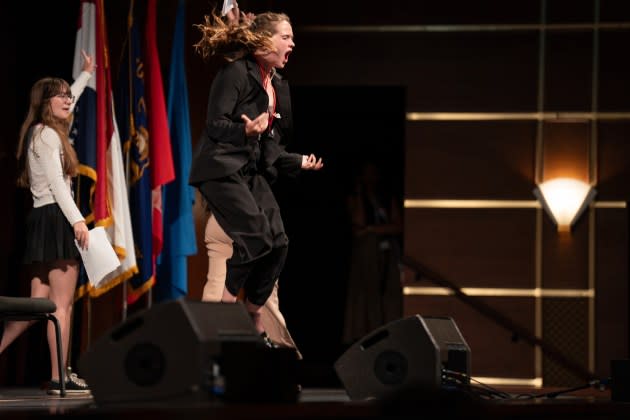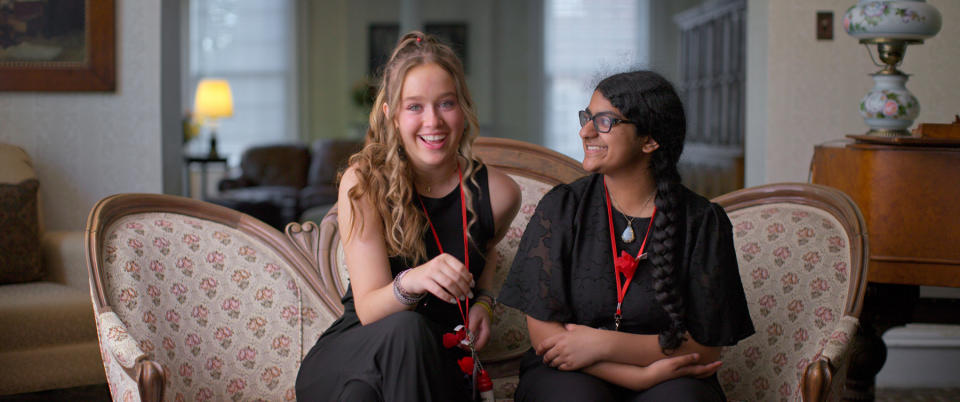‘Girls State’ Revisits Faux-Government Program From the Female Perspective. It’s Not Pretty
- Oops!Something went wrong.Please try again later.
- Oops!Something went wrong.Please try again later.
- Oops!Something went wrong.Please try again later.

You may remember Boys State, the 2020 documentary in which filmmakers Amanda McBaine and Jesse Moss embedded themselves with the decades-old program that lets teenagers get a taste of the political process. Watching as hundreds of young Texans played out mock versions of campaigning, strategizing, stumping and either sticking to their ideological guns or compromising their values for votes, you could easily see the reflection of the real thing in miniature. These politicos-in-training were learning just how miraculous, how malleable and how broken our 21st century system for policy-making is, courtesy of first-hand lessons in civic duty and dirty tricks. You could feel both hopeful watching the film (these children are our future!) and cynical (these children are our future?!).
The American Legion has run an equally immersive program for young women as well, and while it wasn’t inevitable that McBaine and Moss would train their cameras on their original subject’s XX-chromosome counterpart, you crossed your fingers that they’d consider visiting the highs and lows of this exercise from across the gender aisle. Less a sequel than a sibling, Girls State shares a few things in common with the original doc besides their creators: Both follow a handful of fresh-faced, would-be political sharks and minnows during a single session’s intense week-long run, and both hit the seemingly endless river of streaming services — Apple TV+, in this case — in what can safely be called contentious election years. There are a several huge le différences this time around, however, and not exactly the kind that inspire you to throw a hearty Vive in front of them.
More from Rolling Stone
These Apple AirTag Trackers Are On Sale for a Record Low of Just $18 Each
The Justice Department Is Suing Apple for 'Green Bubble' Discrimination
This time around, McBaine and Moss pivot from the Lone Star State to the Show Me State, with a bit of luck on their side: For the first time in 80 years, Missouri will be holding both programs on the same campus. The proximity to each other comes with certain caveats …for the female half of the equation. Don’t walk anywhere by yourselves. Don’t wear tops that are backless. Don’t fraternize with the dudes that are participating practically side by side to your program, and ladies, please don’t make us spell out why. In short, remember you’re a young woman living in a nation still defined by double standards. Also, quit asking the counselors about it, they will shut that conversation down. But do feel free to sing rousing songs during assemblies, complete with choreographed movements that don’t suggests future presidential or gubernatorial candidates so much as freshman-year cheer squads. “If the boys don’t have to do this,” one Girls State hopeful says, “I’m going to be pissed.”
We’ve barely met the young women who the filmmakers will be following, and already a sense of mounting frustration is emanating from the ranks. As for the subjects themselves, they seem to represent a nice cross-section of teens with an eye toward shaping the future of the country. Emily harbors ambitions of being a rock star, a broadcast journalist or POTUS in 2040, though maybe she’ll be all three. She’s also conservative, and very self-consciously defensive about all these young liberals — who she loves, don’t get her wrong — pre-judging her for it. Nisha is Indian-American, painfully shy and self-admittedly socially awkward, which doesn’t stop her from making friends, notably with her bubbly competition for a supreme court seat, Brooke. Tochi is a first-generation Nigerian-American who politely deflects requests to say something in Igbo and would make one hell of a district attorney. Faith was voted “Most Judgemental” in school; her politics were closer to alt-right because of her family, but then “I got older” and her opinions evolved. Cecilia is from St. Louis, is outspoken, and isn’t afraid to call out the program on the fact that she and her peers don’t need to be told how to dress, thank you very much.

Girls State replicates the template of its companion piece — and of most modern docs with a competition of sorts at their center — with testimonial interludes, tag-alongs to group gatherings and tension over who will and won’t have their ambitions realized. Familiarity doesn’t breed contempt here, just a slight sense of déjà vu. There’s a formula at work here, a winning and well-proven one, and McBaine and Moss stick to it. Minds are changed and opened, unlikely bonds are formed, wisdom and inspiration come forth from out of the mouth of babes (as in those of a younger age, and not the often demeaning term applied to women). It’s a doc that acknowledges that we live in an era in which Tracy Flick is now rightfully seen as a hero of Election, rather than the de facto villain. These participants assuredly leave their week in faux-politics different than when they arrived.
Yet the word “Dobbs” keeps popping up in every other conversation, and with good reason: The leak of the Supreme Court verdict regarding the then-potential overturning of Roe v. Wade had occurred right before this session had begun, and it’s here that Girls State distinguishes itself from its fraternal twin. The very real threat of these young women having their basic rights and autonomy over their bodies taken away from them has quite naturally introduced top notes of anxiety in the air. And the fact that, unlike the Boys State events happening right on the other side of campus, it takes the program until near to its halfway point to let them debate this in public forums only underlines the overall disparity. “I’m a little sick of the fluff,” one participant says. “I bet they’re talking about the 2nd Amendment,” another woman imagines a few days in. “I bet they’re not talking about crop tops.”
Boys State had the advantage of being able to aim at bigger symbolic failings regarding what we talk about when we talk about the political process and its effect on the American experiment. Girls State would love to address exact same issues, but like society itself, finds that it’s forced to relitigate basic notions of freedom and sexism and inequity in lieu of addressing fundamental issues. And like the young women who we spend nearly two hours with, we also emerge feeling both tinges of empowerment and a palpable sense of deflation. After the mock Supreme Court rules on privacy issues regarding abortion clinics and mandatory counseling, Brooke is asked about the exercise. It was thrilling, she admits. But then she realizes that none of this changes the fact old men in the real world are preparing to make actual rollbacks that will render such what-ifs moot, and “I also feel kind of sad.” Right after that session ends, Roe vs. Wade will indeed be overturned. We know exactly how she feels.
Best of Rolling Stone

